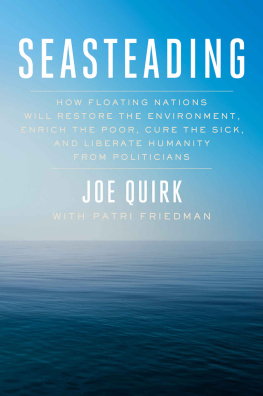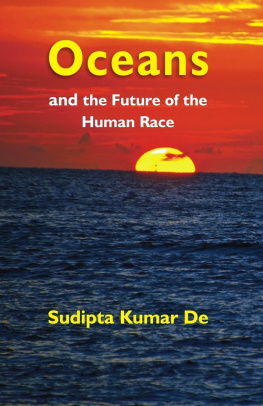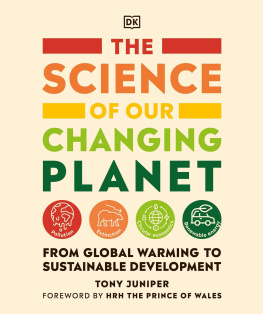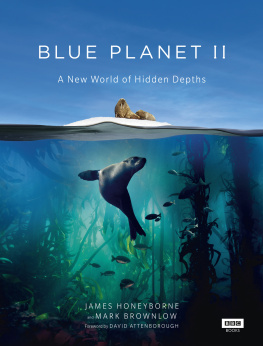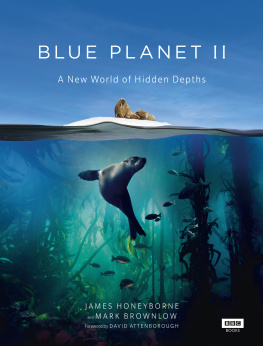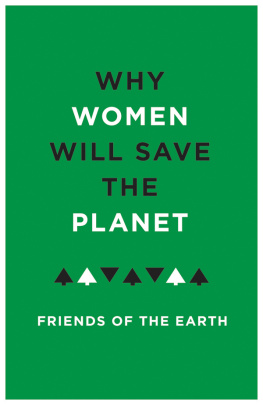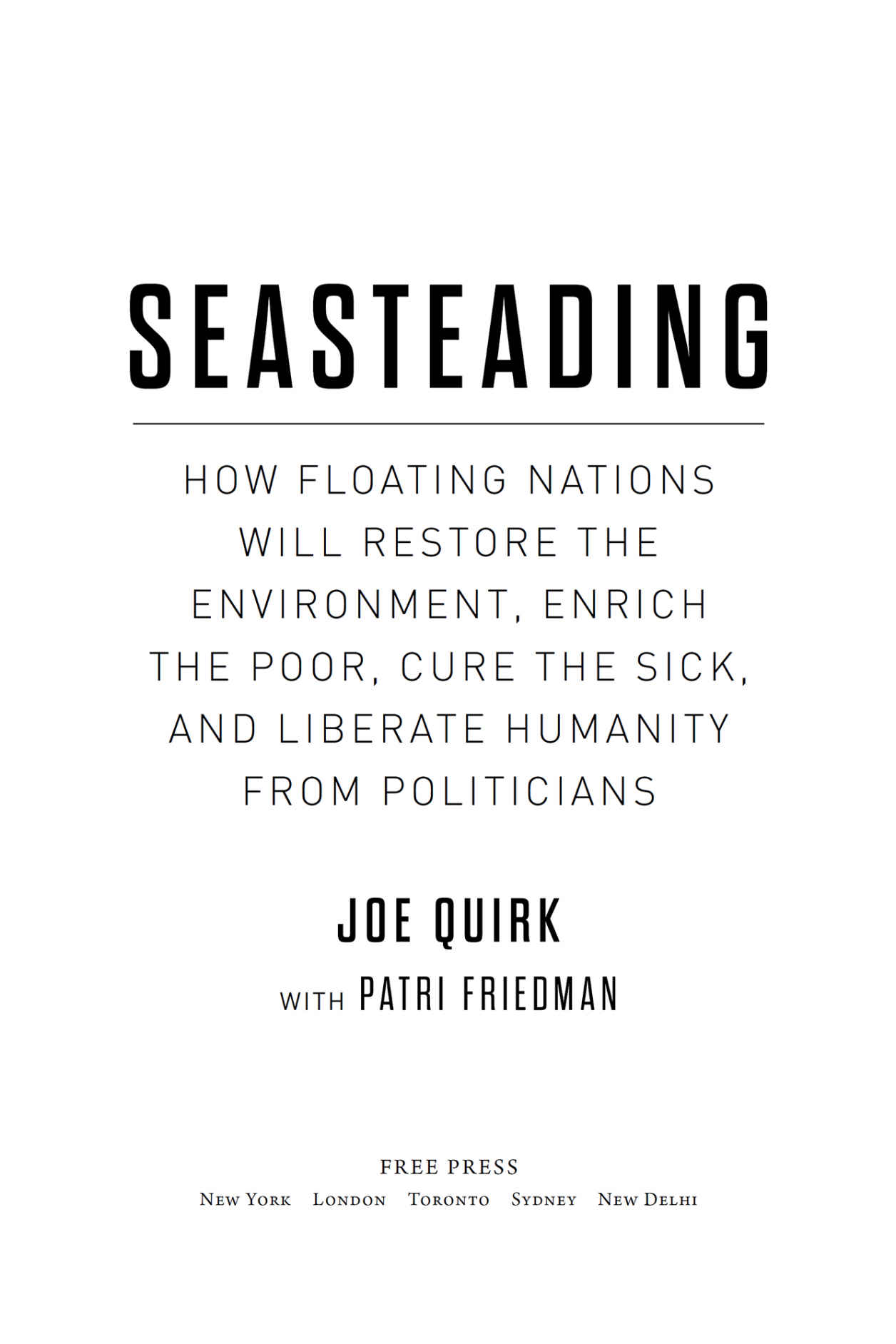Thank you for downloading this Simon & Schuster ebook.
Get a FREE ebook when you join our mailing list. Plus, get updates on new releases, deals, recommended reads, and more from Simon & Schuster. Click below to sign up and see terms and conditions.
CLICK HERE TO SIGN UP
Already a subscriber? Provide your email again so we can register this ebook and send you more of what you like to read. You will continue to receive exclusive offers in your inbox.
CONTENTS
To the Aquatic Generation
It is from the ocean that will be born the destiny of civilizations to come.
Jacques Rougerie, marine architect
What if...
The way to decrease ocean pollution is to increase ocean populations?
The way to decrease the number of wars is to increase the number of countries?
The way to discover political solutions is to empower your political enemies?
We wont need to fight when we can float?
Its easier to float than fly?
We built civilization in the wrong place?
You could create your own microcountry at sea?
PROLOGUE
This book is divided into four parts.
The first part, Seavilization Now, shows the strides to seasteading that have occurred already, and asks us to overcome the mental barriers that prevent us from seeing them.
The second part, Environment, introduces environmentally restorative technologies currently serving humanity that are advancing rapidly and can be fully realized only on the ocean.
The third part, Economy, describes the prosperity that is often unleashed once new nations are established, and asks us to confront the fact that these blessings cannot be rapidly realized within the jurisdictions of existing governments.
The last and fourth part, Freedom, explains why floating societies will likely be more peaceful than continental governments, simply because fluid mobility will revolutionize the incentives by which individuals interact. In addition, it considers the possibility that the oceans will introduce us to a social technology that may solve one of the oldest and most intractable challenges in civilization.
PART I
SEAVILIZATION NOW
Chapter 1
HOME
This Isnt Planet Earth
You Are Called
If you sit alone at night by the sea, your heart will adjust to the rhythm of the surf. Give it a minute. Allow the chatter in your mind to cease. Listen to your breath follow the cadence of the waves. In the silence, youll get in touch with the best of yourself, your core values, and youll know the job we have to do. If 9 billion of us are to survive in 2050, we are charged with six moral imperatives as ancient as they are urgent:
feed the hungry,
enrich the poor,
cure the sick,
restore the environment,
power civilization sustainably, and
live in peace.
In this book, you are going to meet six aquapreneurs who plan to fulfill these moral imperatives by working to build floating nations on the sea. They are launching their ambitions from four continents, and they are radically misunderstood by landlubbers. Several of them have independently cited 2050 as a deadly deadline: an approaching pinch point in the supply of several key commodities that humanity needs to survive.
Water. According to Growing Blue, a gigantic consolidation of data from industry analysts, scientists, academia, and environmental professionals, 52 percent of the world population will be exposed to severe water scarcity by 2050, and continuing our current course will put at risk roughly $63 trillion US , or the equivalent to 1.5 times the size of todays entire global economy.
Food. Even assuming a 50 percent increase in agricultural efficiency, by 2050 we will need to increase the land space devoted to farmland 22 million square kilometers, or 8.5 million square miles, an area nearly equivalent in size to North America.
Oil. Searching for consensus about peak oil, the point in time when the maximum global rate of crude oil extraction is reached became a fools errand when the hydrofracking revolution only further polarized the debate due to deep uncertainty about the actual size of undiscovered world oil reserves. Many of the most popular doomsdates refer to current economically available oil and not total physically existing oil, as if extraction technologies will never improve and prices never adjust. So lets just say that the most pessimistic analysts say peak oil has already occurred, while the most optimistic analysts say 2050.
Fish. In 2006 the journal Science published a four-year study written by an international group of ecologists from Canada, Panama, Sweden, Britain, and the United States, which predicted that, at prevailing trends, the world will run out of wild-caught seafood in 2048though the assumptions behind these claims have been widely disputed.
Fertilizer. The soil is running out of phosphate, a crucial ingredient in fertilizer required for farming. The most optimistic estimate for peak phosphorus, the point at which we reach the worlds maximum rate of phosphorus production, is 2050.
Land. Eighty percent of the worlds expanding megacities are sinking on a coast or river plain while sea levels rise. More than 1 million people move to cities each week, and by 2050, about half of the human population will live within 100 kilometers of a coast.
Humanity is poised to plunge in 2050. We can drown or we can float.
We dont know enough about each subject to judge whether the 2050 deadline predicted in multiple domains is realistic, or a convenient focal point around which forecasters simplify their perception of trends. For instance, as recently as 2012, scientist and policy analyst Vaclav Smil, who researches food production, technical innovation, and risk assessment, argues that the famous 2009 Scientific American article on this subject of peak phosphorus is balderdash. All we know is that through the ages, every Armageddon predicted by experts fails to occur, because humanity solves the problem. The bottomless source of solutions, as author Julian Simon argues in his classic book The Ultimate Resource , is human creativity.
What would you do with political freedom, almost limitless energy, and nearly half the Earths surface?
See the Sea
The globally emerging Blue Revolution became conscious of itself when Google engineer Patri Friedman realized that the economic theories elucidated by his grandfather, Milton Friedman, and developed by his father, David Friedman, would soon be put to the test by a rapidly approaching technology. Milton and David each asserted that political conflict was caused by political power, and that the solution to political conflict lay not in further consolidating power in the most virtuous government officials, but by the radical decentralization of power among millions of individuals with freedom and choice. How could such an organic bottom-up system work? In 1973 David published The Machinery of Freedom , describing the practical details, and Milton and his wife, Rose, later wrote Free to Choose , explaining the moral principles. Millions were swayed by the ideas, which have been vigorously discussed and debated ever since, but a practical, full application of them was impossible. The Friedmans proposed that humanity rethink society from the ground up. Unfortunately, all ground was claimed by existing governments.

